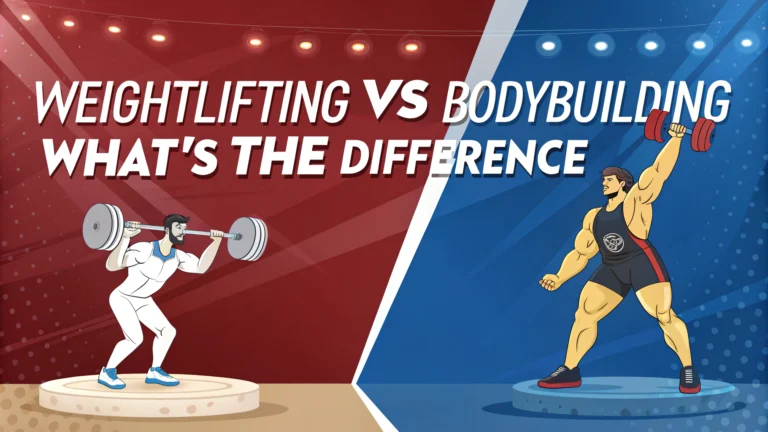Many fitness enthusiasts confuse
Each discipline requires specific training methods, nutrition plans, and mental preparation. Understanding these differences helps you choose the path that aligns with your fitness goals.
Key Differences in Training Approach
Weightlifting - Focus on Olympic lifts (snatch, clean and jerk)
- Emphasis on technique and speed
- Lower rep ranges (1-5 reps)
Bodybuilding - Variety of isolation exercises
- Higher rep ranges (8-12 reps)
- Focus on muscle connection
Nutrition Requirements
| Factor | Weightlifting | Bodybuilding |
|---|---|---|
| Protein Needs | 1.6-2.0g/kg | 2.0-2.4g/kg |
| Meal Timing | Performance-focused | Growth-focused |
Competition Goals and Standards
“The main difference lies in the end goal – weightlifters train for performance, while bodybuilders train for appearance.” – International Weightlifting Federation
Body Composition Goals
Understanding these distinct goals helps shape training and nutrition strategies:
Weightlifting Body Goals - Power-to-weight ratio optimization
- Weight class considerations
- Functional muscle development
Bodybuilding Body Goals - Maximum muscle hypertrophy
- Symmetrical development
- Low body fat percentage
Training Frequency and Recovery
Each discipline demands different recovery protocols and training schedules based on their unique stress factors.
| Aspect | Weightlifting | Bodybuilding |
|---|---|---|
| Training Sessions | 4-6 per week | 5-6 per week |
| Rest Between Sets | 2-5 minutes | 30-90 seconds |
| Recovery Days | 1-2 full rest days | Split routines, rotating muscle groups |
Equipment and Gear Requirements
Proper equipment selection impacts safety and performance in both disciplines.
Essential Weightlifting Gear - Olympic barbells and plates
- Weightlifting shoes
- Wrist wraps and lifting belt
Bodybuilding Equipment - Various machines and free weights
- Cable systems
- Resistance bands
Making Your Choice
Select your path based on personal goals and preferences rather than following trends.
“Choose the discipline that aligns with your long-term fitness vision and lifestyle commitments.” – International Sports Sciences Association
Choose Weightlifting if you: - Enjoy technical challenges
- Want to develop explosive power
- Are interested in competitive lifting
Choose Bodybuilding if you: - Prioritize physical appearance
- Enjoy structured routines
- Want to focus on muscle isolation
Frequently Asked Questions About Weightlifting vs Bodybuilding
Q: What is the main difference between weightlifting and bodybuilding?
Weightlifting focuses on performing specific competition lifts (snatch and clean & jerk) for maximum weight and power, while bodybuilding aims to develop muscle size and aesthetic physique through various exercises and strict diet protocols.
Q: Can you build muscle doing Olympic weightlifting?
Yes, Olympic weightlifting builds muscle mass, particularly in the:
- Quadriceps
- Posterior chain
- Shoulders
- Upper back
However, muscle growth isn’t as targeted or extensive as bodybuilding.
Q: Do bodybuilders lift heavier than weightlifters?
No. Olympic weightlifters typically lift heavier weights in their specific movements. For example:
| Movement | Typical Elite Numbers |
|---|---|
| Weightlifter Clean & Jerk | 180-230kg |
| Bodybuilder Bench Press | 140-180kg |
Q: Which burns more calories: weightlifting or bodybuilding?
Olympic weightlifting typically burns more calories per hour (350-400) compared to bodybuilding (250-300) due to its explosive nature and full-body movements.
Q: How often do weightlifters train vs bodybuilders?
Training frequency comparison:
- Weightlifters: 4-6 sessions per week, often twice daily
- Bodybuilders: 4-6 sessions per week, usually once daily
Q: Is weightlifting or bodybuilding better for fat loss?
Both are effective for fat loss when combined with proper nutrition. Weightlifting has higher acute calorie burn, while bodybuilding creates more muscle mass for long-term metabolic benefits.
Q: What’s the difference in competition preparation?
Bodybuilders require extensive preparation:
- 12-16 weeks of strict dieting
- Gradual dehydration
- Tanning
- Posing practice
Weightlifters focus mainly on technique refinement and peak strength timing.
Q: Do weightlifters need protein as much as bodybuilders?
Both require significant protein intake (1.6-2.2g/kg body weight), but bodybuilders typically consume more due to their focus on muscle hypertrophy.
Q: Which is more expensive: weightlifting or bodybuilding?
Bodybuilding typically costs more due to:
- Higher supplement expenses
- Larger food budget
- Competition prep costs
- Personal training
Q: Can you combine weightlifting and bodybuilding?
Yes, many athletes use a hybrid approach called powerbuilding, which combines strength movements with hypertrophy training, though it may not optimize either discipline’s specific goals.



















